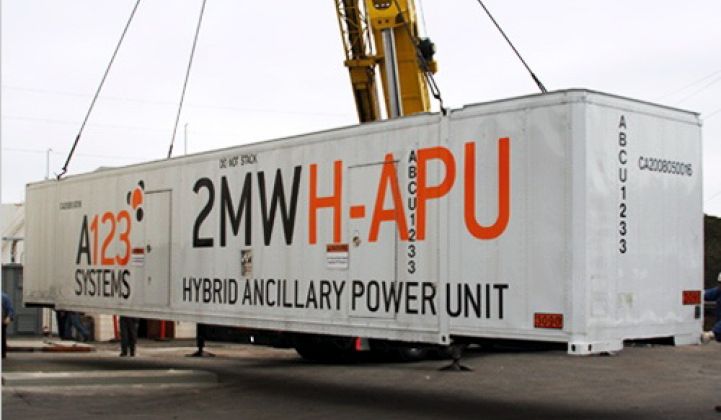A123 (Nasdaq: AONE) confirmed a record loss of $125 million in the first quarter of 2012 and said it would seek debt financing as it struggles with a massive battery recall that will take up its existing factory capacity for some time.
It's the latest in a string of bad news for the Waltham, Mass.-based company around the March recall of batteries from its Michigan factory, built with hundreds of millions of dollars in federal and state grants and loan guarantees. A123 reported the recall in March, and revealed that it had played a role in problems for key customer Fisker and its plug-in hybrid Karma sports cars. A123 laid off about 125 of its 850 Michigan employees in November, a move it blamed on reduced orders from Fisker, though it said it hoped to rehire the workers in the coming year.
The recall is expected to cost the firm $66.8 million, and it's also going to take up A123's manufacturing capacity for the next few quarters, though that will merely postpone, rather than cancel, orders from customers, the company reported. A123 Chief Executive David Vieau said in a Tuesday statement that the defect that caused the recall has been corrected and that replacement production was underway.
A123 customers include Fisker, General Motors, BMW, SAIC Motor Corp., Tata Motors and Smith Electric Vehicles, though the company didn't specify which were involved in the recall. The transportation sector remains A123's most important line of business, although its grid storage business has been growing in the past year or so, with installations and orders that added up to 100 megawatts by the end of 2011, much of it in partnership with AES Energy Storage.
First-quarter revenue of $10.9 million was down 40 percent from $40.4 million in the fourth quarter of last year, when the company reported an $85 million loss. A123 also reduced its 2012 revenue estimates to $145 million to $175 million, down from an already-reduced $230 million to $300 million.
The MIT spinout that went public in 2009 also said it plans to raise $50 million through a private offering of convertible notes paying 6 percent interest, the Wall Street Journal reported. A123 spent $46.5 million in cash in the first quarter and had $113.1 million remaining as of the end of Q1 2012.
A123 pre-reported the bad news of its record quarterly loss on Friday, which pushed down shares about 8 percent to $1.03 per share. Tuesday's news pushed shares up about 12 percent in afternoon trading to $1.04 per share. It's a big drop from the 2009 IPO price of $13.50 per share.
A few months ago, a battery manufactured by A123 exploded and caused an injury at a General Motors battery lab. The battery leaked gases into a lab at GM’s Warren Technical Center in Michigan and an explosion ensued that sent one employee to the hospital with chemical burns, according to the Wall Street Journal. A123 is also receiving its share of class-action lawsuits.
Its defective battery replacement campaign's price tag will be spread out over several quarters. Since A123 will continue to operate at a loss, it will have to raise significant capital to cover its losses, the recall, and a recently announced shareholder suit -- thus, the debt offering.
About a year ago, VC investor Vinod Khosla spoke to about 300 energy storage experts at the annual Energy Storage Association (ESA) meeting and predicted that A123 would not be around in ten years. He cited lithium's volatility and inherent safety issues. That news was less satisfying for the audience (which included A123).



